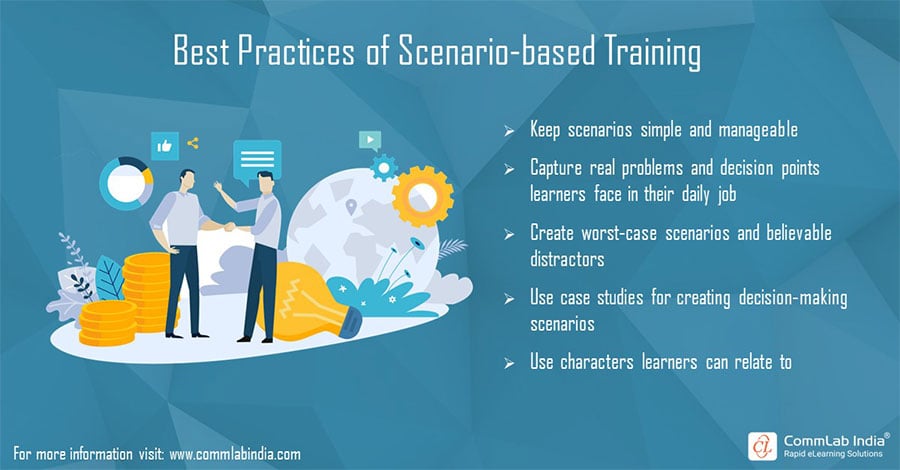Best Practices of Scenario-Based Training for Effective Learning

In training and development, innovation is the key to engaging learners and ensuring knowledge retention. One approach that has gained significant importance is scenario-based learning. This methodology takes learners beyond theoretical concepts and immerses them in real-world situations, fostering practical skills and critical thinking. In this blog, we will explore the concept of scenario-based learning, its benefits, and some best practices of scenario-based training.
Understanding Scenario-Based Training
Scenario-based training is an instructional approach that presents learners with real-life situations they might encounter in their professional roles. These scenarios often mirror complex, decision-making environments that require learners to apply their knowledge and skills to solve problems, make decisions, and achieve outcomes. By doing so, learners bridge the gap between theoretical understanding and practical application. Here is an infographic with best practices to follow when it comes to scenario-based training.

Also, explore some amazing benefits of scenario-based training to make learning more engaging and immersive.
→ Download Now: eLearning Trends for the New Reality
Benefits of Scenario-Based Training
Real-World Relevance
Scenario-based training replicates real-life situations, making the learning content more relatable and applicable. Learners are exposed to challenges and decisions they might encounter in their day-to-day work, enabling them to develop practical skills that can be readily transferred to their work.
Active Engagement
Rather than passive consumption of information, scenario-based training requires learners to actively participate and think critically. By placing learners at the center of the scenario, they become decision-makers, driving their learning process, and strengthening their understanding of the subject matter.
Problem-Solving Skills
Scenarios present learners with complex problems that need to be solved. This approach nurtures critical thinking, analytical reasoning, and decision-making abilities. Learners must weigh options, consider consequences, and devise effective solutions, gaining skills that are valuable in both personal and professional contexts.
Long-Term Retention
Due to the interactive and immersive nature of scenario-based training, learners tend to retain information for longer periods. The real-life context and emotional engagement associated with scenarios create stronger memory associations, helping in recalling information as and when required.
Mistake-Friendly Risk-Friendly Environment
Scenario-based training provides a safe space for learners to make mistakes without real-world consequences. These errors can be used as learning opportunities, allowing learners to identify misconceptions, refine their understanding and drive better learning outcomes.
Parting Thoughts
Scenario-based training is a powerful approach for training that bridges the gap between theory and practice. By immersing learners in realistic situations, this approach fosters practical skills, critical thinking, and confident decision-making. When designed thoughtfully, scenario-based training not only engages learners but also equips them with skills that are readily applicable to their professional roles. As training methodologies evolve, embracing scenario-based training can lead to a more effective and impactful learning experience. No doubt scenario-based training is trending and is loved by many organizations. Grab our eBook and explore some more eLearning trends!



![5 Tips for Effective Scenario-based Learning [Infographic]](https://blog.commlabindia.com/hubfs/Imported_Blog_Media/scenario-based-learning-design-tips-info.jpg)

